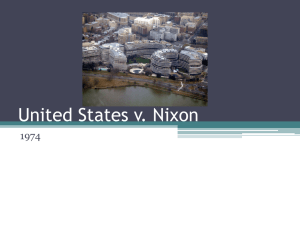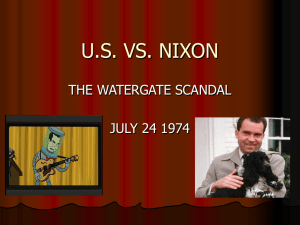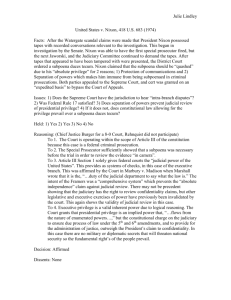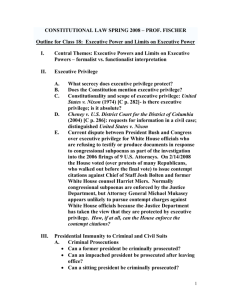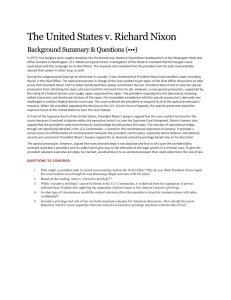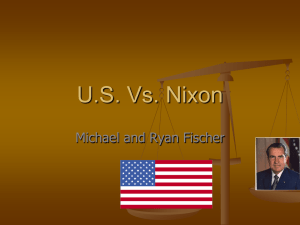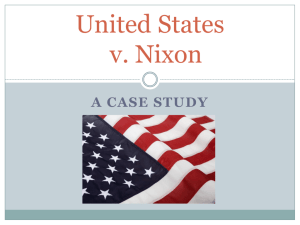U.S. v. Nixon (1974)
advertisement
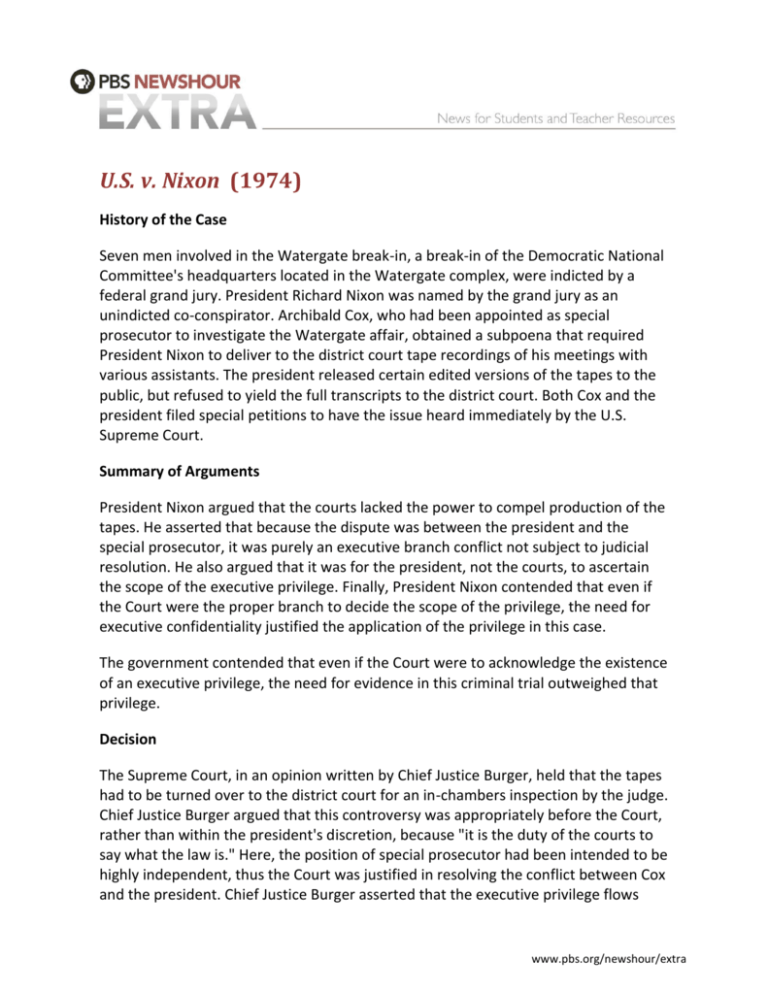
U.S. v. Nixon (1974) History of the Case Seven men involved in the Watergate break-in, a break-in of the Democratic National Committee's headquarters located in the Watergate complex, were indicted by a federal grand jury. President Richard Nixon was named by the grand jury as an unindicted co-conspirator. Archibald Cox, who had been appointed as special prosecutor to investigate the Watergate affair, obtained a subpoena that required President Nixon to deliver to the district court tape recordings of his meetings with various assistants. The president released certain edited versions of the tapes to the public, but refused to yield the full transcripts to the district court. Both Cox and the president filed special petitions to have the issue heard immediately by the U.S. Supreme Court. Summary of Arguments President Nixon argued that the courts lacked the power to compel production of the tapes. He asserted that because the dispute was between the president and the special prosecutor, it was purely an executive branch conflict not subject to judicial resolution. He also argued that it was for the president, not the courts, to ascertain the scope of the executive privilege. Finally, President Nixon contended that even if the Court were the proper branch to decide the scope of the privilege, the need for executive confidentiality justified the application of the privilege in this case. The government contended that even if the Court were to acknowledge the existence of an executive privilege, the need for evidence in this criminal trial outweighed that privilege. Decision The Supreme Court, in an opinion written by Chief Justice Burger, held that the tapes had to be turned over to the district court for an in-chambers inspection by the judge. Chief Justice Burger argued that this controversy was appropriately before the Court, rather than within the president's discretion, because "it is the duty of the courts to say what the law is." Here, the position of special prosecutor had been intended to be highly independent, thus the Court was justified in resolving the conflict between Cox and the president. Chief Justice Burger asserted that the executive privilege flows www.pbs.org/newshour/extra from the Constitution and the Court is the ultimate interpreter of that Constitution; consequently, it was for the Court and not the president to define the scope of the privilege. He then determined that the privilege was merely presumptive, rather than absolute; thus, it might be overcome in certain cases by the "legitimate needs of the judicial process." Chief Justice Burger then proceeded to balance the interests of the president and the prosecution. He began by noting that the president's right to secrecy was different from that of an ordinary individual: "A President and those who assist him must be free to explore alternatives in the process of shaping policies and making decisions and to do so in a way many would be unwilling to express except privately." Nonetheless, Cox had proven that the tapes were relevant to the government's case and "[t]he need to develop all relevant facts in the adversary system is both fundamental and comprehensive." Chief Justice Burger asserted that the claim of privilege did not rest on the ground that the tapes contained military or diplomatic secrets; thus, it was appropriate to subordinate the privilege to the search for truth in a criminal trial. He was quick to note that this decision was based on a unique set of facts. The president had asserted only a "generalized interest in confidentiality," while the specific need for relevant evidence in a criminal trial is a requirement of the Fifth Amendment's guarantee of due process. Chief Justice Burger noted that in conducting the inspection of the president's tapes, "the District Court has a very heavy responsibility to see to it that Presidential conversations . . . are accorded that high degree of respect due the President of the United States." Even under the circumstances, President Nixon's communications were to receive "the greatest protection consistent with the fair administration of justice." Aftermath Twelve days after the decision, the president made an abridged transcript of the tapes available to the public. Fifteen days after the decision, President Nixon resigned. Significance While the outcome of the case was unfavorable to President Nixon, United States v. Nixon expanded the power of the presidency. This was the first time the Supreme Court acknowledged that an executive privilege exists; the decision thus resolved decades of controversy over the constitutionality of that privilege. Source: Hartman, Gary, Roy M. Mersky, and Cindy L. Tate. "United States v. Nixon." Landmark Supreme Court Cases. New York: Facts On File, Inc., 2004. American History Online. Facts On File, Inc. www.pbs.org/newshour/extra
